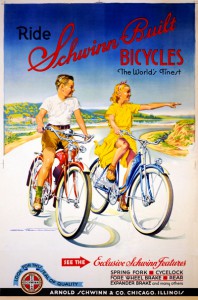The bicycle of relationships

We were a little skeptical at first that she would be able to ride the five or six miles we wanted to run. But there she was, the entire journey, happily pedaling in front, in flip flops, singing and encouraging us to keep up. With us sweating and running behind, she clearly had no problem leading the way. On a bike, our little daughter was considerably faster.
Steve Jobs has a wonderful presentation he gave years ago in which he invokes a study showing how humans on bicycles are more efficient travelers than even the highest in the animal kingdom, the condor. He references a Scientific American study which found humans to be fairly average in terms of locomotion efficiency, but off the charts when on a bicycle. Jobs called the computer the “bicycle for the mind.”
I think the same is true when we add communication and trust to relationships. I had an interview with Howard Behar, former President of Starbucks who said, “At the end of the day it’s probably the only thing that matters in any organization. Whether it’s your family or your work, trust is the engine of a great life.”
Trust can be the bicycle to drive great relationships.
In an interview with Paul Stebbins, CEO of World Fuel Services, he talked about a powerful early life experience involving trust. Stebbins had worked for a gas station in Texas for almost three years, starting at the age of 13. The gas station owner was a local man, known to everyone in town. On Paul’s 16th birthday, the owner threw him the keys to the shop, asked him to close up as usual at 9:00 p.m., got in his car, and drove home. Paul recalls being deeply humbled and appreciative of this act of complete trust:
If I do anything, as long as I live, it will be to have that same trust for somebody in my life as well. It certainly changed my view of the world, and I’ll never forget it. I was, you know, ten feet off the ground and so proud that somebody would actually trust me with that. But I felt a real sense of responsibility, and that’s ultimately the core of it, is the risk to give somebody the freedom to be responsible is a remarkable thing.



